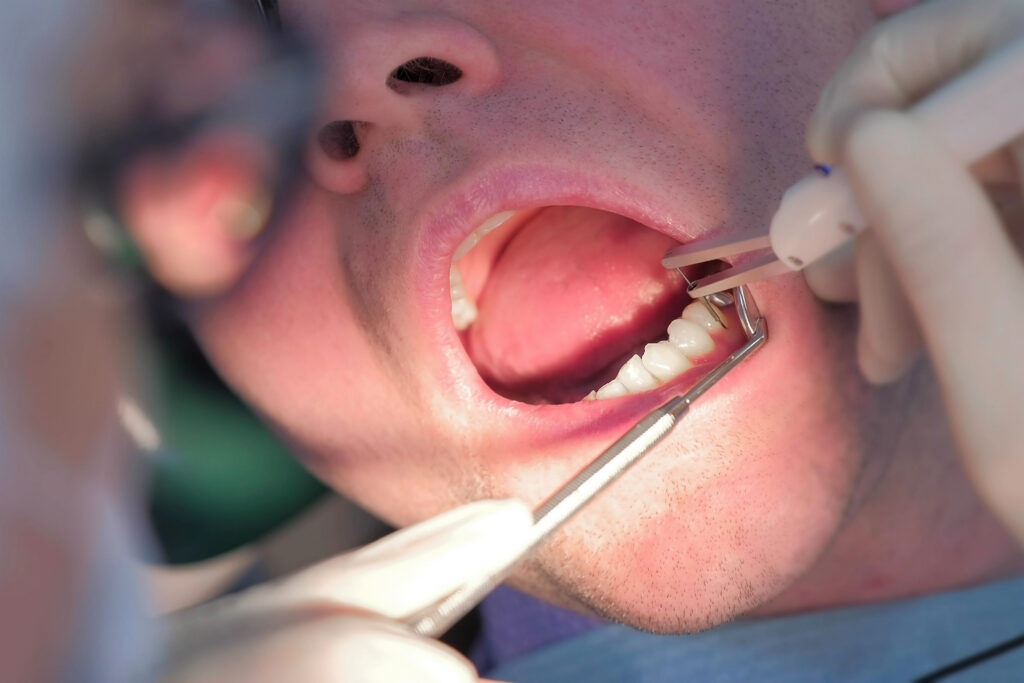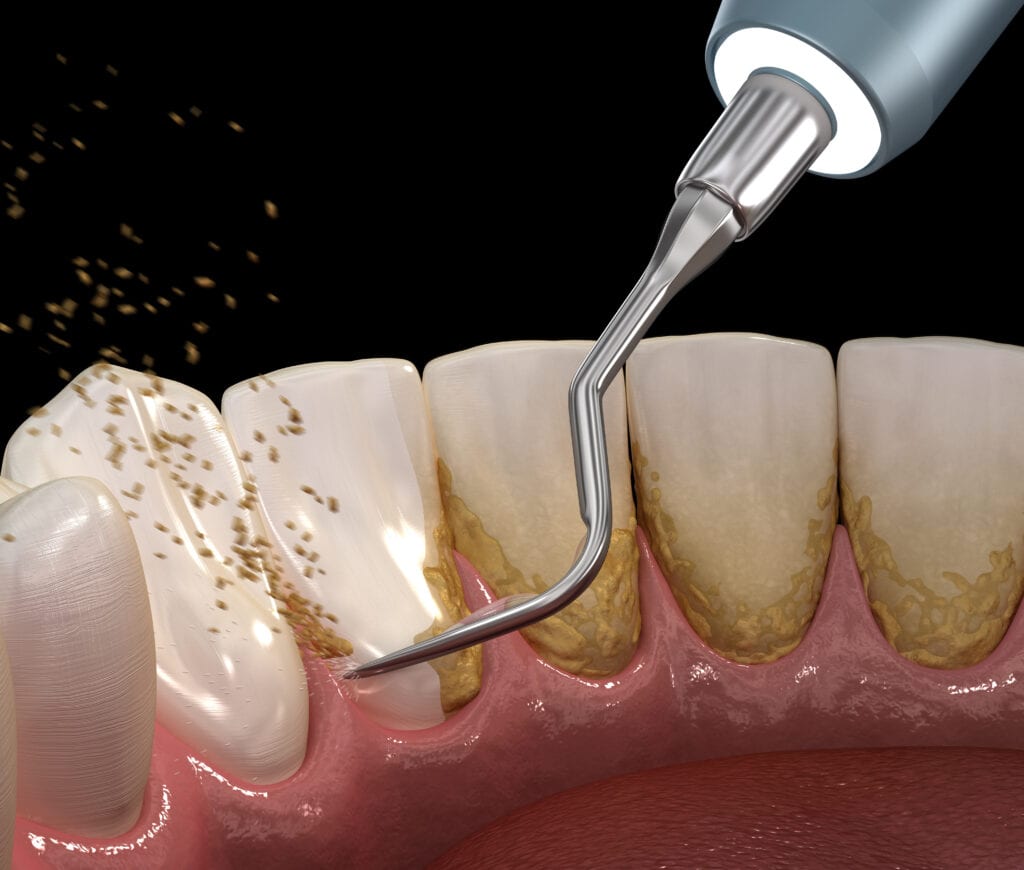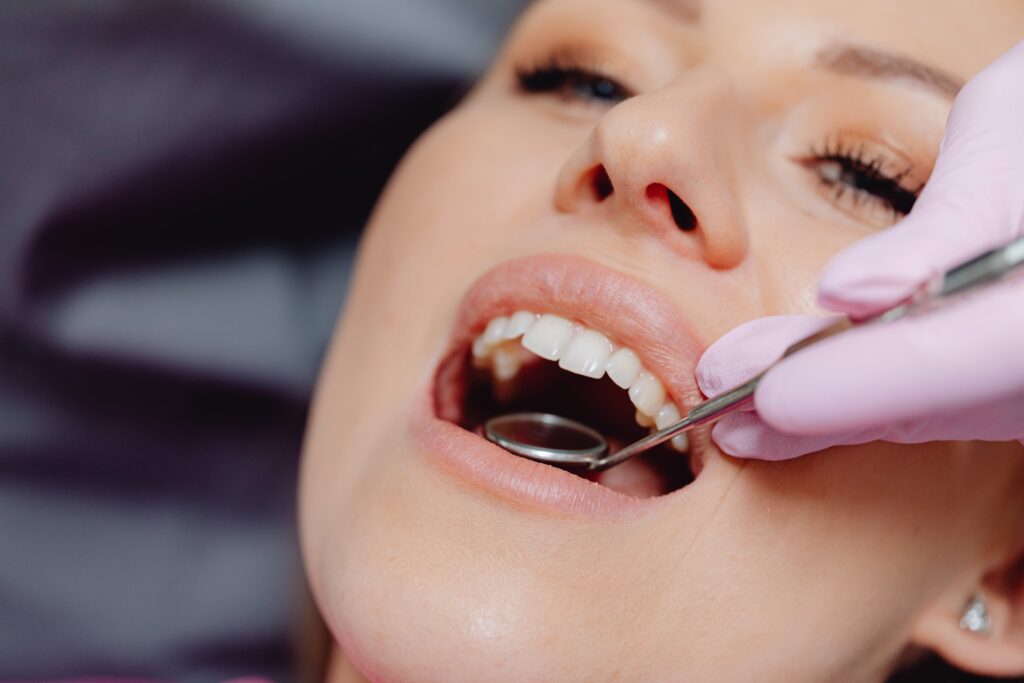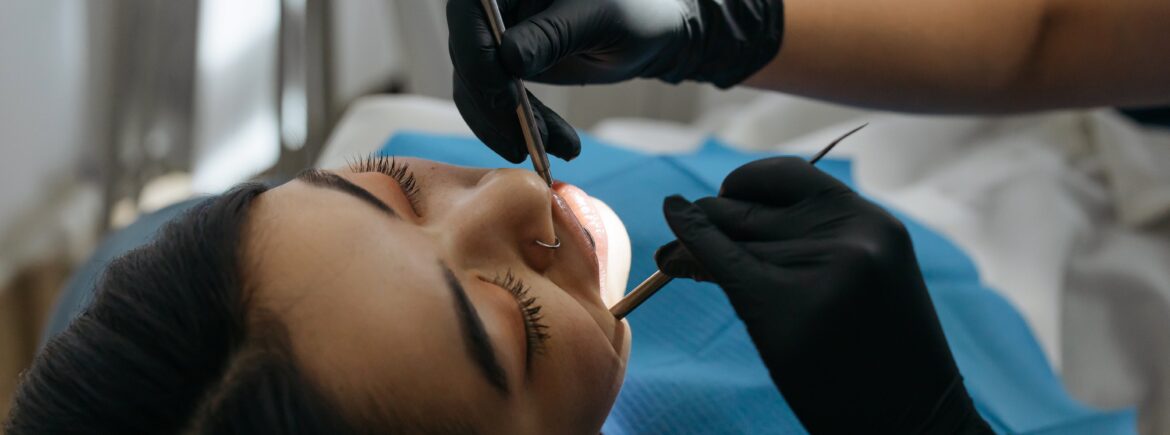Gum Disease Treatment in Perth
Taking care of your gums is a crucial part of maintaining overall oral health. In this article, our Perth dentist explores the signs and symptoms of gum disease, its causes, and gum disease treatment available right here in Perth.
Our focus is to provide you with clear, practical information so you can make informed decisions about your gum health. Whether you’re looking to prevent gum disease or seeking treatment options, we’re here to guide you through with straightforward advice and professional insights.

Gum Disease or Periodontal Disease Explained
Gum disease, also known as periodontal disease, begins as gum inflammation and can escalate into a significant oral health concern. The initial stage, called gingivitis, is a common and mild form of this disease. It manifests as swollen or bleeding gums, often the result of dental plaque buildup – a sticky film of bacteria that forms on the teeth. A regular dental visit with a professional South Perth dentist can help improve oral health and keep periodontal disease at bay.
Two Stages of Gum Disease
If left untreated, gingivitis can advance and turn into periodontitis, affecting deeper structures like the periodontal ligament and the bone supporting the teeth, leading to more serious complications. The progression of periodontal disease from simple gum inflammation to a more severe form involves not just the gums but also the supporting bone structure. This advanced stage can lead to a serious gum infection, resulting in significant damage to oral health.
Timely intervention is vital to treat gum disease effectively. Maintaining good oral hygiene, seeking early dental care when noticing symptoms like swollen or bleeding gums, and regular dental check-ups and clean are vital to managing and preventing the progression of periodontal disease.
Symptoms of Gum Disease: What to Watch For
Spotting the early signs of gum disease is key to maintaining your dental health. One of the first things you might notice is a change in your gum line. It can include swollen gums or puffy gums that feel tender when you touch them.
Also, look out for gum diseases in their early stage, where your gums might bleed easily, especially during brushing or flossing. These are important warning signs not to ignore. If you notice these changes, it’s a good idea to see a dentist for a check-up.
Bleeding Gums: A Common Early Warning
Bleeding gums are often one of the first warning signs of gum disease. If you see a bit of blood when you brush or floss, don’t overlook it. This bleeding may be a sign that your gums are inflamed due to the buildup of plaque. It’s a common issue, but addressing it early can prevent it from turning into more severe forms of gum disease.
Redness and Swelling: Indicators of Gum Irritation
Red and swollen gums are clear indicators that something isn’t right with your dental health. These symptoms suggest that your gums are irritated, possibly due to the accumulation of plaque at your gum line. This irritation may lead to gum disease if not treated in time. It’s important to keep an eye on any changes in the appearance of your gums.
Bad Breath: A Possible Sign of Gum Problems
Persistent bad breath or a bad taste in your mouth can be more than just an inconvenience; it could be a sign of gum disease. When harmful bacteria build up in your mouth, they can cause a noticeable odour. It’s a warning sign that shouldn’t be ignored, as it can indicate the onset of gum disease.
Gum Tissue Recession: Understanding the Risks
Receding gums means your gum tissue is pulling back from your teeth, exposing more of the tooth or even its root. It can lead to sensitive teeth and is a significant warning of severe gum disease.
Recession of the gums can eventually lead to bone loss and loose teeth if not addressed. It’s important to take this symptom seriously and consult your dentist to measure the severity of the recession.
The Importance of Timely Treatment for Gum Health
Taking care of your gums promptly is vital in preventing problems like tooth decay and tooth loss. When you choose to have gum disease treated early, you’re not just protecting your teeth and gums but also supporting your overall well-being.
Ignoring gum issues can lead to poor oral health; according to research there may be a link between gum disease and other health conditions, including heart disease and systemic diseases. So, remember, looking after your gums is a crucial step in caring for your health as a whole.
Gum Disease Causes: More than Just Dental Hygiene
While poor oral hygiene is a well-known cause of gum disease, there are other risk factors, too. Things like your lifestyle choices, health conditions, and even genetics play a part. It’s important to know that taking good care of your teeth is great, but sometimes gum disease can happen for other reasons.
The Impact of Smoking and Tobacco Use
Smoking and using chewing tobacco are significant risk factors for gum disease. They not only harm your overall health but also affect your gums. If you smoke or use tobacco, your risk of developing gum problems increases, making it even more important to take care of your oral health.
Genetic Factors: Understanding Your Risk
Genetics can play a role in your risk of developing gum disease. If your family has a history of dental problems, you might be more prone to them, too. Understanding this risk factor helps you take extra care and possibly prevent gum issues before they start.
Medications and Oral Health: Potential Side Effects
Certain medicines can have side effects that impact your oral health. Some can cause dry mouth or affect your hormonal changes, which might increase the risk of gum disease. If you’re on medication, it’s a good idea to talk to your dentist about how it might affect your gums.
Systemic Health Conditions and Gum Disease
Some health issues, especially those related to blood sugar, like diabetes, can affect your gums. These systemic health conditions can make managing gum disease more challenging. It’s crucial to keep both your overall health and oral hygiene in check.

Professional Gum Disease Treatments in Perth
When it comes to treating periodontal disease, Perth offers a variety of professional options. From routine dental exams that remove plaque and keep your gums clean to more advanced treatments, there’s a solution for every stage of gum disease.
These treatments are designed not just to cure existing problems but also to prevent gum disease from progressing further.

Deep Cleaning: Scaling and Root Planing
Deep cleaning, often referred to as scaling and root planing, is a dental procedure specifically aimed at treating gum disease. Here’s a breakdown of how it works:
Scaling: This is the first step in the deep cleaning process. A dental hygienist uses specialized tools to meticulously remove plaque and tartar (hardened plaque) from both above and below the gum line. Plaque is a sticky film consisting mainly of bacteria, and tartar is plaque that has hardened on the teeth due to mineral deposits from saliva. Scaling ensures that all these deposits are cleared away, which are otherwise inaccessible through regular brushing and flossing.
Root Planing: After scaling, the next step is root planing. This involves smoothing out the roots of the teeth. The dental hygienist will carefully smooth the root surfaces of the teeth, removing any remaining plaque and tartar. This smoothing helps the gums reattach to the teeth more snugly. It also makes it harder for plaque to accumulate along the root surfaces in the future.
The primary goal of both scaling and root planing is to create a clean and smooth surface beneath the gums, promoting better oral health and helping the gums to heal and tighten around the teeth. This process reduces gum swelling, prevents further gum disease, and can mitigate issues such as bad breath or tooth sensitivity caused by exposed tooth roots due to gum recession.
Laser Therapy: A Modern Approach to Gum Care
Laser therapy is a modern technique to manage gum disease. It uses focused light beams to precisely target and remove diseased tissue while leaving healthy tissue untouched. This approach is less invasive than traditional methods, promoting faster healing and more comfortable treatment for patients.
Flap Surgery: Treating Advanced Gum Disease
Flap surgery effectively treats advanced gum disease when the gums no longer hold onto the teeth firmly. During this procedure, the dentist lifts the gums to remove hardened plaque and root planing is performed to smooth the surface. It helps the gums reattach firmly to the teeth and reduces the risk of future bone loss.
Bone and Tissue Grafts: Rebuilding Your Smile
In cases of severe periodontal disease leading to bone loss, bone and tissue grafts can help rebuild your smile. A bone graft involves placing new bone or bone-like material in the area of bone loss to promote regeneration. This procedure is often combined with other treatments to enhance the stability and appearance of your teeth.
Overcoming Fear: Gum Disease Treatment Can Be Stress-Free
Fearing dental treatments, especially if they involve surgical procedures like surgical wisdom teeth removal or surgical treatment options for gum disease, is quite common among dental patients.
Understanding the sedation options available can make gum disease treatment a much less daunting experience. For mild anxiety, happy gas or nitrous oxide is a popular choice, offering a relaxed feeling during the procedure with quick recovery afterwards. If you need deeper relaxation, IV sedation is an option, where a sedative is administered intravenously, helping you stay calm and comfortable with little memory of the procedure.
For those with significant anxiety or undergoing extensive treatments, sleep dentistry using general anaesthesia is available, allowing you to be completely asleep and unaware during the procedure. Discussing these options with your dentist can help you find the right approach for a stress-free and comfortable dental experience.
Tips to Prevent Gum Disease
Keeping your teeth and gums healthy is easier than you might think. By following a few simple tips, you can prevent gum disease and maintain a bright, healthy smile.
Firstly, make sure to brush your teeth at least twice a day. When brushing your teeth, use a soft toothbrush and fluoride toothpaste, as this can help in fighting plaque and tartar buildup. Remember to brush gently to avoid causing any damage or making your gums pull away from your teeth.
Another important habit is to floss daily to remove food particles and plaque from between your teeth. It is crucial in preventing any form of gum disease from taking hold.
Pay attention to your diet, too. Poor nutrition can weaken your immune system, making it harder to fight off infections, including those that cause gum disease. Eating a balanced diet rich in vitamins and minerals supports healthy teeth and gums.
Lastly, don’t skip your dental check-ups. Regular visits to your dentist allow for early detection of any symptoms of gum disease. Early intervention can prevent the progression to a more serious stage of gum disease, helping to keep your teeth fit and healthy.
By incorporating these simple practices into your daily routine, you can effectively prevent gum disease and enjoy a lifetime of healthy smiles.

Ready for Healthy Gums? Visit Acts Dental Today!
Discover the path to healthier teeth and gums at Acts Dental! Our team of friendly professionals is dedicated to providing top-notch gum disease treatment in a comfortable and stress-free environment.
Whether you’re looking to prevent gum problems or need comprehensive care, we’re here to support you with the latest techniques and personalized attention.
In Perth, we excel as a Medibank preferred provider, HBF preferred provider, NIB preferred provider, HCF preferred provider, and Bupa preferred provider dentist.
Don’t let gum disease hold you back – take the first step towards a healthier smile and a happier you. Book your appointment by contacting (08) 9474 5083 at Acts Dental today and experience the care your smile deserves!


